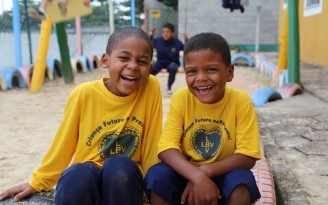
Women and girls towards a Culture of Peace
Critical thinking and sentiment in favor of sustainable development
Suelí Periotto
Monday | March 24, 2014 | 11:36 AM | Last update: September 22, 2016, 4:07 PM (Brasilia time)

The maturing process promoted by Education can encourage the engagement and positive attitude that are so necessary for the urgent changes needed on our planet. Waste recycling illustrates this premise well. It is an example of a practice that can start with just one home and from there spread to neighbors, to families in another street, or to whole neighborhoods, which will become enthused with the idea. At this rate sometime later the habit will become a reality in large areas of the city, demonstrating just how strong small or major changes in behavior can be.
It is true that attitudes like these are the result of internal motivation, because of the wish that human beings have of making a difference in society and because of their desire to cooperate, even in the simplest of activities.
Brain and heart
To this end, the Legion of Good Will’s educational proposal values raising people’s awareness and establishing a critical view. It encourages social actors to exercise their power of transformation in order to face up to the serious social problems that undermine the human hope of a better world. For us of the LBV, taking action requires agents with enlightened hearts that are permanently filled with enthusiasm. Such people are never a prisoner to sterile discourses or to irate conducts and/or conducts marked by violence.
Educating with an all-encompassing Ecumenical Spirituality is the unique approach proposed by the teaching method created by the President of the LBV, José de Paiva Netto, which is comprised of the Pedagogy of Affection (directed at children up to the age of 10) and the Ecumenical Citizen Pedagogy (for children starting at the age of 11).
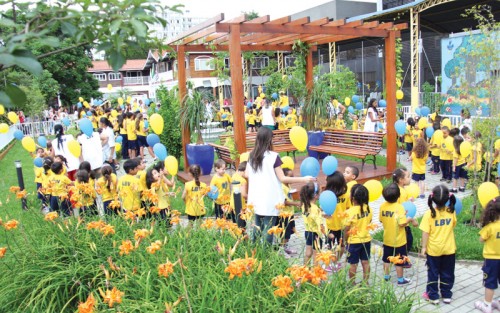
The concern of this teaching proposal is with the complete development of the human being (biopsychosocial Spirit-being), combining both “Brain and Heart”, in other words, sentiment and reason. The aim is to create a significant learning experience that invites students to become participants in building a Culture of Peace. “Education, a theme always on the agenda. It is urgent that it be disseminated and acknowledged by all of us as a safe path that shortens the distance among social classes. Education is also an efficient antidote against violence, criminality, diseases, and everything that harms the healthy development of the people,” recommends the Organization’s president.
This innovative educational methodology currently benefits thousands of children, young people, adults, and the elderly in the LBV’s formal schools and socio-educational and socio-assistance programs in nearly 80 Brazilian cities and in six other countries where the Organization has autonomous bases: Argentina, Bolivia, Paraguay, Portugal, the United States, and Uruguay. Those assisted are motivated to assume a posture of greater involvement in discussing and solving problems that affect the community where they live. By encouraging the individual’s critical thinking, it provides them with room for reflecting on their role, including the fulfillment of the eight Millennium Development Goals (MDGs).
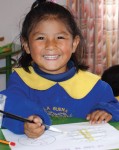
Such an understanding comes when we become aware that we are part of a world that is lacking in personal intervention by those who live in it, and who are individually and collectively responsible for our planetary dwelling. That is why we need to direct our efforts towards complete sustainability. Those who attend the LBV’s schools and programs feel motivated to take part in actions in favor of environmental preservation and valuing Life.
Own Methodology
For more than six decades the Legion of Good Will has been working to offer quality education in a violence-free school environment. In all the activities of the LBV, women and girls, who are treated as equals with men and boys, receive the support they need to develop their own socio-economic autonomy, achieve inclusion, and have an active voice in society, while remaining committed to sustainable actions.
Research, debates, delving into issues that affect a home’s surroundings, proposing proactive measures, and simulating community actions are all part of the strategies used by the Organization’s own methodology, the MAPREI (Learning Method through Rational-Emotional-Intuitive Research). The school students and participants of the various LBV programs receive the attentive support of educators and other professionals during formal education or recreational-pedagogical activities. From early infancy, for example, they are encouraged to experience and build up a series of attitudes linked to protecting the environment; defending themselves (warning children and young people about the danger of drugs); and reflecting on and searching for alternative paths to those selfish feelings that only lead to an inhuman progress.
It is possible through education to build a Culture of Peace, with actions (systematized or not) that are significant for the youth. It is worth repeating that educating young people with ethical, ecumenical, and spiritual values is the basis of the teaching proposal created by educator Paiva Netto. Indeed, he believes that filling the hearts of the little ones with the idea of cultivating good feelings will result in a natural consequence: when they get older and later become adults, they will return to society what was given to them.
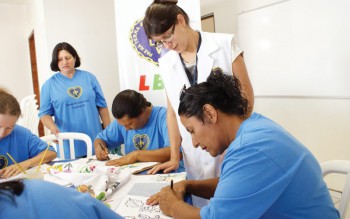
The Pedagogy of Affection and the Ecumenical Citizen Pedagogy are inspired in the life and teachings of the Celestial Educator, Jesus. In His visible passage on Earth He left us an important message of Fraternal Love, particularly in the Gospel according to John, chapter 13, verses 34 and 35: “A New Commandment I give you: Love one another as I have loved you. Only by this shall all of you be recognized as my disciples, if you have the same Love for one another.” In complying with this supreme order, the LBV defends the banner of Solidarity, Fraternity, and Peace and opposes those selfish sentiments that have led Humanity to wars, hunger, and diseases.
Education, therefore, needs to invest in the development of the intellect without forgetting that we are all beings with a mind and soul that need spiritual comfort; in the words of the LBV’s president, we need to have “a view beyond the intellect”. I am certain that girls and women, boys and men will be grateful for every educational proposal that respects them and considers the potential each one has to contribute with positive actions. When such actions are fraternally added up they will make a difference within the context of the next set of global targets: the Sustainable Development Goals (SDGs).
An example that inspires generations
On October 18, 2013, a pleasant surprise changed the routine of the students from the Good Will Educational Complex, in São Paulo, Brazil: a visit from the school’s founder. Paiva Netto supervised the rooms of the educational complex, which is attended by approximately 1,500 students. The reception by the students and teachers was moving, because they were able to enthusiastically welcome there a man of Good Will who always works to offer others a wide range of quality services that pays particular attention to their material and spiritual needs.
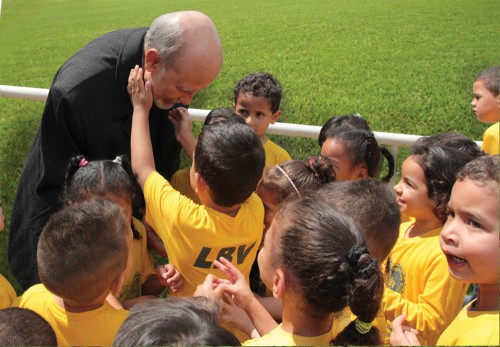
The Organization’s president visited various environments, such as the Primary Education area for children up to 6 years old. He toured the courtyard and the recently inaugurated wooded garden, with its fruit trees and flowers. The place was full of little boys and girls who warmly greeted him the whole time he was there. Educator Geni Bertolin highlighted: “His presence provided us with very moving moments, such as when the little children gently placed their tiny hands on his arm and shoulder and looked delightedly into his face.”
The homages and manifestations of gratitude from the students did not stop there. In the Educational Institute, for elementary and middle school students and Youth and Adult Education — EJA (program for youth and adults who did not have the opportunity to finish their studies), the courtyard became colorful because of the joy and smiles on the students’ faces. He supervised the new facilities of the Bruno Simões de Paiva Library, which is now housed in a bigger and more modern area. The name is a tribute to the father of the school’s founder, who encouraged his son to read from an early age. There, the teaching team carries out countless activities, including the Permanent Reading Encouragement and Information Interpretation Program. Activities are undertaken by nearly all age groups, from nursery (using cloth books for the toddlers) to EJA.
On the visit to the library, the Goodwill Instrumentalist Group and the Ecumenical Children and Youth Choir, formed by students from the school, performed some of the songs from their repertoire. Among them the highlights were two compositions by the school’s founder: Loving with the Love of God and Prayer for Tranquility. The choir also presented a piece in the Brazilian sign language (LIBRAS).
Quality education, art, and fraternal values go hand-in-hand both in the activities of the Good Will Educational Complex as well as in the LBV’s other socio-educational units. By the initiative of educator Paiva Netto, valuing feelings is added to the excellent content, thus forming “Brain and Heart”.
For student Geovanna Ribeiro, 16, in the last year of high school, all the values she has learned became especially evident at that moment. “It was a great honor to welcome him here where we study. It was a very moving day and undoubtedly we shall never forget it!”
